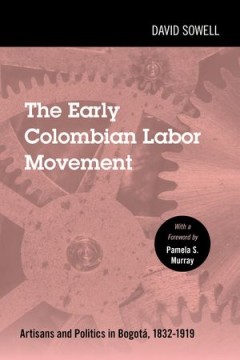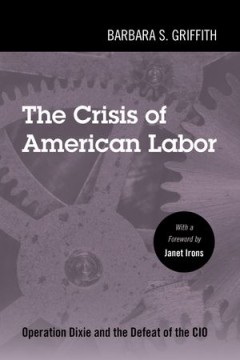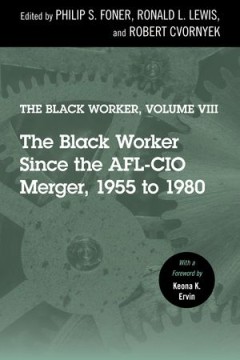Filter by

The Early Colombian Labor Movement : Artisans and Politics in Bogota, 1832-1919
In The Early Colombian Labor Movement, David Sowell traces the history of artisan labor organizations in Bogotá and examines long-term political activity of Colombian artisans in the century after independence. Relying on contemporary newspapers, political handouts, broadsides, and public petitions, Sowell analyzes the economic, social, and political history of the capital's artisan class, a m…
- Edition
- -
- ISBN/ISSN
- -
- Collation
- -
- Series Title
- -
- Call Number
- 650

The Crisis of American Labor : Operation Dixie and the Defeat of the CIO
Operation Dixie—the attempt by the Congress of Industrial Organizations (CIO) to unionize the postwar South—was on the defensive almost as soon as it began in 1946. Although the South had a longstanding reputation for being particularly unreceptive to organized labor, the CIO decided that a Southern drive was necessary to consolidate the considerable gains unions had made during the war and…
- Edition
- -
- ISBN/ISSN
- -
- Collation
- -
- Series Title
- -
- Call Number
- 650

Growth, Structural Transformation, and Rural Change in Viet Nam: a Rising Dra…
Many developing countries—Viet Nam included—continue to struggle to raise incomes per capita. A common feature of the growth and development process is a fundamental change in the pattern of economic activity, as households reallocate labour from traditional agriculture to more productive forms of agriculture and modern industrial and service sectors. Broad structural transformation and wid…
- Edition
- -
- ISBN/ISSN
- 9780198796961
- Collation
- -
- Series Title
- -
- Call Number
- 320.17 GRO g

Cultural Integration of Immigrants in Europe
The concepts of cultural diversity and cultural identity are at the forefront of the political debate in many western societies. In Europe, the discussion is stimulated by the political pressures associated with immigration flows, which are increasing in many European countries. The imperatives that current immigration trends impose on European democracies bring to light a number of issues that…
- Edition
- -
- ISBN/ISSN
- 9780199660094
- Collation
- -
- Series Title
- -
- Call Number
- 572.9 BIS c

Gender Equality and Work-Life Balance : Glass Handcuffs and Working Men in th…
Pressure to achieve work-life "balance" has recently become a significant part of the cultural fabric of working life in United States. A very few privileged employees tout their ability to find balance between their careers and the rest of their lives, but most employees face considerable organizational and economic constraints which hamper their ability to maintain a reasonable ""balance"" be…
- Edition
- -
- ISBN/ISSN
- 9781138856776
- Collation
- -
- Series Title
- -
- Call Number
- -

The Black Worker, Volume 8 : The Black Worker Since the AFL-CIO Merger, 195…
Published over the course of six years, the eight volumes of The Black Worker: From Colonial Times to the Present contain a voluminous amount of archival material. Through their publication, Philip S. Foner, Ronald L. Lewis, and Robert Cvornyek birthed a new generation of Black labor history scholarship. Theirs was big, synthesis-style, social, political, intellectual, and institutional history…
- Edition
- -
- ISBN/ISSN
- -
- Collation
- -
- Series Title
- -
- Call Number
- 650

The Black Worker, Volume 8 : The Black Worker Since the AFL-CIO Merger, 1955-…
Published over the course of six years, the eight volumes of The Black Worker: From Colonial Times to the Present contain a voluminous amount of archival material. Through their publication, Philip S. Foner, Ronald L. Lewis, and Robert Cvornyek birthed a new generation of Black labor history scholarship. Theirs was big, synthesis-style, social, political, intellectual, and institutional history…
- Edition
- -
- ISBN/ISSN
- -
- Collation
- -
- Series Title
- -
- Call Number
- 650

The Black Worker, Volume 7
Published over the course of six years, the eight volumes of The Black Worker: From Colonial Times to the Present contain a voluminous amount of archival material. Through their publication, Philip S. Foner, Ronald L. Lewis, and Robert Cvornyek birthed a new generation of Black labor history scholarship. Theirs was big, synthesis-style, social, political, intellectual, and institutional history…
- Edition
- -
- ISBN/ISSN
- -
- Collation
- -
- Series Title
- -
- Call Number
- 650

The Black Worker, Volume 5 : The Black Worker from 1900 to 1919
Published over the course of six years, the eight volumes of The Black Worker: From Colonial Times to the Presentcontain a voluminous amount of archival material. Through their publication, Philip S. Foner, Ronald L. Lewis, and Robert Cvornyek birthed a new generation of Black labor history scholarship. Theirs was big, synthesis-style, social, political, intellectual, and institutional history …
- Edition
- -
- ISBN/ISSN
- -
- Collation
- -
- Series Title
- -
- Call Number
- 650

The Black Worker, Volume 4 : The Black Worker During the Era of the American …
Published over the course of six years, the eight volumes of The Black Worker: From Colonial Times to the Present contain a voluminous amount of archival material. Through their publication, Philip S. Foner, Ronald L. Lewis, and Robert Cvornyek birthed a new generation of Black labor history scholarship. Theirs was big, synthesis-style, social, political, intellectual, and institutional history…
- Edition
- -
- ISBN/ISSN
- -
- Collation
- -
- Series Title
- -
- Call Number
- 650
 Computer Science, Information & General Works
Computer Science, Information & General Works  Philosophy & Psychology
Philosophy & Psychology  Religion
Religion  Social Sciences
Social Sciences  Language
Language  Pure Science
Pure Science  Applied Sciences
Applied Sciences  Art & Recreation
Art & Recreation  Literature
Literature  History & Geography
History & Geography